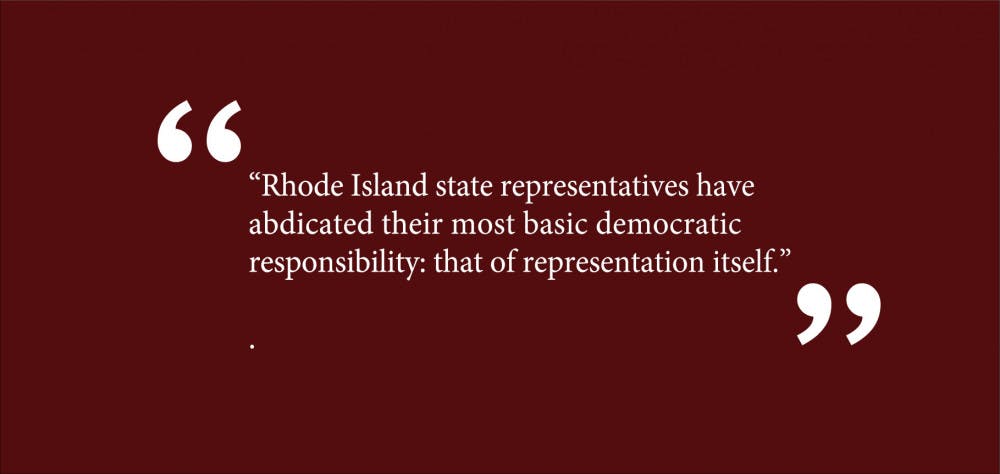Today, the state Senate Judiciary Committee is set to hear public commentary on S.2077, a joint resolution to inaugurate an independent redistricting commission in Rhode Island. If passed by both chambers of the state assembly and ratified by a majority of Rhode Island voters, the resolution would take effect next year, closing the book on nearly 40 years of extreme partisan gerrymandering by the state legislature.
Last week, The Herald covered the “uphill battle” that the proposal will likely face in the state assembly. Senior Staff Writer Benjamin Pollard ’23 was correct to note that the fight against political corruption will be a fierce one: Rhode Island’s Democratic state representatives have configured notoriously partisan legislative maps tracing back as early as 1972, and their efforts to consolidate control over the state legislature have only accelerated in recent cycles.
While other states (particularly those under Republican legislative control) have seen considerable public backlash against their partisan gerrymandering practices, Rhode Island’s legislature has, for the most part, evaded criticism from anti-corruption activists. This is a mistake — and a catastrophic one at that.
There has been a trend in recent years toward implementing legislation aimed at combating gerrymandering practices. Today, there are eight states that have established independent redistricting commissions, a few of which were instituted after the 2010 census. Initial studies have shown that independent commissions can actually neutralize partisan bias in the redistricting process. These findings hold particular promise in areas where redistricting has long been marred by inequitable reapportionment practices that further entrench the power of the party drawing the lines and effectively disenfranchise wide swaths of voters across the state.
Over the past decade, a staggering proportion of Rhode Island’s “Democratic” lawmakers have backed unmistakably conservative policies, ranging from disparaging women’s reproductive rights to nearly rejecting the legal recognition of same-sex marriage to passing a rigid voter identification law in response to many of the same unsubstantiated voter fraud concerns generally reserved for Republican political circles. As state Republican Representative Brian Newberry said in a 2014 New York Times interview, “Lots of Democrats (in Rhode Island) would be Republicans somewhere else, but they don’t feel they can win without a ‘D’ next to their name.”
In other words, Rhode Island politicians have systematically misrepresented their true ideological commitments in order to win over a liberal state electorate — all while rigging the redistricting process in the interest of diminishing the electoral prospects of both progressive Democrats and authentic Republicans. PlanScore, a project dedicated to quantifying historical gerrymandering data, reported that following the 2012–2014 redistricting process, Rhode Island’s redistricting plan was more heavily skewed toward Democrats than 92 percent of all enacted plans nationwide.
Believe it or not, this form of political corruption is perfectly legal. Just last year, the United States Supreme Court ruled that partisan gerrymandering claims are “nonjusticiable,” meaning that the federal judiciary has no power to rule on whether any such electoral meddling — no matter how flagrantly discriminatory — is unconstitutional. The Court has long expressed its reticence to rule on “political questions,” preferring to leave such determinations in the hands of the state legislatures.
In the absence of a judicial remedy, one thing remains abundantly clear. Rhode Island state representatives have abdicated their most basic democratic responsibility: that of representation itself. They have corrupted our system of government and betrayed the same voters who entrusted them with the power of public office. And in the absence of an independent redistricting body, there is nothing to stop them from doing it again.
It doesn’t matter whether you’re a Republican or a Democrat, a liberal or a conservative or somewhere in between. Even if you personally benefit from the political gerrymander, all of our rights are at stake when representatives of either party work to undermine the constitutional value of equal protection in our election process.
It’s about time for our representatives to do better — and time is of the essence. If the state assembly refuses to act this year, it will be another decade before Rhode Islanders will have another chance at a fair redistricting process. It is crucial that Rhode Island voters put pressure on their representatives to support political equality by voting in favor of resolution S.2077.
Olivia Siemens ’21 is the co-founder of the Rhode Island chapter of Represent.Us, a national group working to end political corruption and improve election processes nationwide.
Correction: A previous version of this op-ed referenced resolution S.2007 in its title and body when it actually refers to S.2077. The Herald regrets the error.





